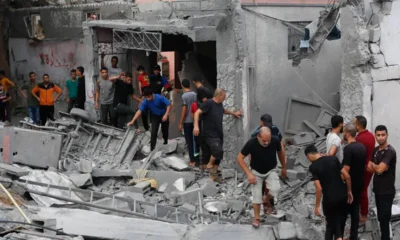NEWS
International Law: U.S Officials divided over Israel’s credibility

An internal memo from the State Department has revealed deep divisions among senior U.S. officials regarding the credibility of Israel’s assurances regarding the use of U.S.-supplied weapons in accordance with international humanitarian law.
According to the memo reviewed by Reuters, some officials have expressed skepticism, stating that they do not find Israel’s assurances “credible or reliable.” This sentiment contrasts with others within the department who continue to support Israel’s representation.
Under a National Security Memorandum issued by President Joe Biden in February, Secretary of State Antony Blinken is tasked with reporting to Congress by May 8 on whether he finds Israel’s assurances regarding the use of U.S. weapons to be credible and compliant with U.S. or international law.
By March 24, several State Department bureaus had submitted their contributions to an initial “options memo” for Blinken’s consideration.
While parts of the memo remain classified, it provides insight into the internal divisions within the State Department regarding Israel’s compliance with international humanitarian law, particularly in relation to the Gaza conflict.
According to a U.S. official, different components within the department held varying positions on accepting or rejecting Israel’s assurances, with some taking no definitive stance.
A joint submission from four bureaus, including Democracy Human Rights & Labor; Population, Refugees and Migration; Global Criminal Justice and International Organization Affairs, expressed “serious concern over non-compliance” with international humanitarian law during Israel’s prosecution of the Gaza conflict.
This submission cited multiple examples of Israeli military actions that raised questions about potential violations of international humanitarian law.
Among the concerns raised were the repeated targeting of protected sites and civilian infrastructure, high levels of civilian casualties relative to military objectives, inadequate investigations into violations, and attacks on humanitarian workers and journalists.
Additionally, the memo highlighted instances where Israeli military actions were seen to impede humanitarian aid efforts, including the rejection of aid trucks due to single “dual-use” items and limitations on inspections, as well as attacks on humanitarian sites.



![BBNaija star, Whitemoney reveals why he's careful with ladies in the US [Video]](https://topnaija.ng/wp-content/uploads/2022/06/My-project-2-2-400x240.png)
![BBNaija star, Whitemoney reveals why he's careful with ladies in the US [Video]](https://topnaija.ng/wp-content/uploads/2022/06/My-project-2-2-80x80.png)


























